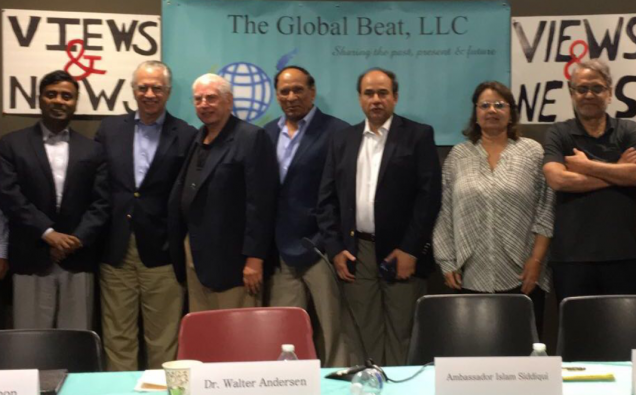
A timely event on the US election last week explored prospects and perils the unusually intense and divisive politicking might have for US politics, society and the foreign policy in the years to come.
Some of the questions that received attention during the discourse included: How far will Trumpism last and what impact it would the many immigrant communities that make America the biggest multicultural place in the world? How has the Brexit factored into American political season? Will the two candidates fighting a rarely high degree of unpopularity be able to improve their standing among people? Are there enough checks and balances in the American political and governance system that can make sure that the US democracy continues to deliver for all and remain a model for the world?
Organized by the Global Beat, the event featured eminent panelists including Dr. Walter Anderson, a South Asian expert, John Lennon, writer and a former Voice of America journalist, Ambassador Islam Siddiqui, a former undersecretary in the Clinton Administration in 1990s, journalist Anwar Iqbal of Dawn English language Pakistani newspaper and Faiz Rehman, head of the VOA’s Urdu Service.
Nuzaira Azam, Director of the Global Beat, initiated the discourse by pointing out that among other things, the election is unique as it is for the first time that a woman, Hillary Clinton, has entered the White House race as candidate of a major party.
Azam also provided some food for thought to a gathering of American, Indian, and Pakistani intellectuals, when she related an account of her meeting with a Pakistani student last year in Karachi, when the student praised the quality of debate in American politics saying it is rarely religion or faith comes under attacks. Several months later, Nuzaira wondered how the outside world would be looking at the American political scene, when exactly the opposite has happened.
Dr. Anderson, who has had a longtime association with SAIS at the Johns Hopkins University, said the race is an important issue in the election and it was unusual that the rival Democratic and Republican nominees were running with such unusual degrees of unpopularity. He said Trump drew his support from among a particular group of Whites. He noted how Pakistanis and Indians, who both identified themselves with conservative values, once espoused by Republicans, were now in league with Democrats.
John Lennon contemplated how race had become a key issue in the 2016 election. On foreign policy, he said, it was difficult to predict how the two candidates will fare vis-à-vis relations with China and some other major issues. He noted that Senator Bernie Sander’s campaign has contributed to ensuring American youth participation in the political process in a revolutionary way and it remains to be seen whether the millennials would voter for Hillary Clinton.
Ambassador Islam Siddiqui criticized Trump’s rhetoric against Muslims. In the current circumstance, he noted, Clinton has an opportunity to win the election and become first female president. In this respect, he cited an analysis in The New York Times, which saw Clinton overwhelmingly favorite for victory in the White House race.
Anwar Iqbal, correspondent of Dawn newspaper, said irrespective of who wins the election, Washington is likely to stay engaged with both Pakistan and Afghanistan in the foreseeable future as there is a realization that war is not a solution to the problem. But he stressed that all South Asian nations particularly Pakistanis and Afghanis have to decide as to what kind of future they want for themselves.
Faiz Rehman informed the gathering how statements and events shape the outcome of elections. He cited the example of former president George W Bush who was able to muster up a majority of American Muslim vote as he met a delegation of Muslims before the election when he ran against Al Gore.
Tasked with moderating the discussion on behalf of Views and News, the co-organizer of the event, I attempted to describe the latest scenario just 65 days away from the election and an three weeks away from the first debate.
“Demagoguery is back with blaring soundbites since Donald Trump’s Phoenix speech on his return from Mexico. The two candidates have a lot of contrasts. Hillary Clinton is rightly or wrongly seen as status quo candidate. Donald Trump, the outsider is out to challenge everything conventional – even the GOPs cherished positions on issues like trade. No political correctness No holds-barred attacks on anybody and everybody, who challenges Trump. Whipping up anti-immigration hype – Muslims and most of the South Asians like Mexicans and other minorities in the cross hairs, and wondering what will happen – identities facing tests – faiths under attack. Despite stark differences, the two candidates have an eerily similar challenge – both are fighting to overcome unusually high degrees of unpopularity.”
So, what happens in the upcoming weeks will be critical from countless standpoints – not the least among them how America will retain its world leadership as a beacon of hope, and a unique nation of immigrants and, as stressed by Dr Anderson, a salad bowl of cultures and center of many forms of arts and sciences, constantly enriched by talent from around the world.









